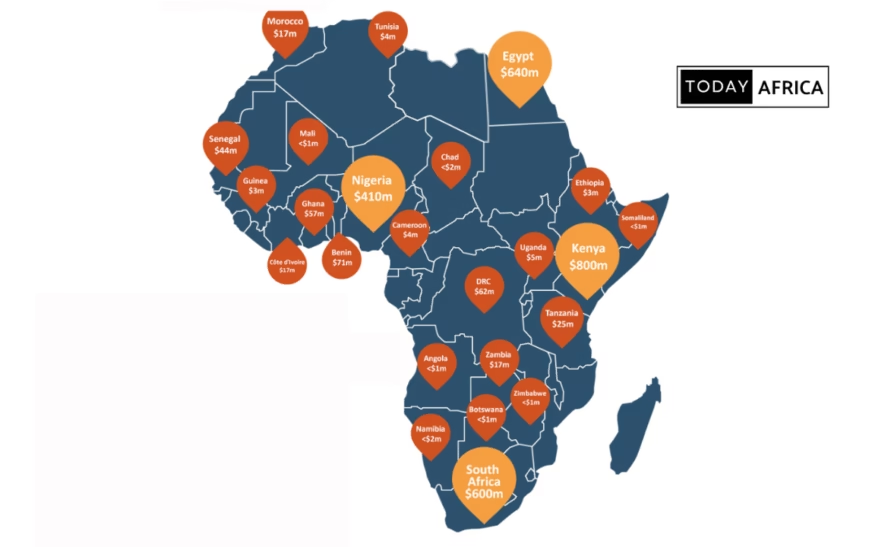Before diving into the world of entrepreneurship, it’s essential to understand why a startup checklist is a critical tool for founders across Africa.
Building a business in Africa presents unique opportunities and challenges – from navigating complex regulatory environments to establishing market trust in often underdeveloped ecosystems.
A checklist acts as a roadmap, helping founders stay on track and avoid unnecessary setbacks. A well-thought-out startup checklist offers the following benefits:
- Keeps the process organized: With a clear checklist, every step in building a startup is laid out. This makes it easier to plan, prioritize, and execute without feeling overwhelmed by the volume of tasks.
- Reduces errors and oversights: Startup founders often juggle multiple responsibilities, and crucial details can slip through the cracks. A checklist ensures nothing important is missed.
- Increases efficiency and productivity: Seeing tasks mapped out helps in executing them logically and delegating where necessary.
- Builds momentum and confidence: Progress is easier to track when tasks are checked off one after the other, creating a sense of achievement that fuels motivation.
Here is a comprehensive startup checklist tailored for African founders, covering the legal, marketing, team-building, and software essentials to lay a solid foundation for success
Legal Checklist for Starting a Business
Establishing a legal foundation is the first and most important step for any startup. Operating without the correct legal structure and registrations can result in fines, lawsuits, or even business closure. This part of the checklist ensures that the business is compliant and protected:
1. Choose a business structure
Decide on the most suitable structure: sole proprietorship, partnership, limited liability company (LLC), or corporation. Each option comes with implications for taxes, liability, and operational flexibility. LLCs are often preferred by startups due to limited personal liability and simplified tax reporting.
2. Pick a business name
The business name creates the first impression for customers and partners. It should be unique, memorable, and legally available in the country of operation. Conduct thorough name searches through business registries and also check domain name availability for the future website.
See Also: How to Legally Protect Your Startup Idea in Africa
3. Register the business
Registering the business makes it a legal entity in the eyes of the government. Requirements and processes vary by country and sometimes even by state or province, so it’s essential to research local procedures and fees.
4. Obtain a tax identification number (EIN or equivalent)
A tax ID functions like a Social Security number for the business and is often required to open a corporate bank account, hire employees, and file taxes.
5. Apply for licenses and permits
Different industries and locations require different licenses or permits. For example, a food and beverage startup may require health and safety permits, while a tech startup handling sensitive data might need data protection compliance certifications.
6. Register trademarks
To protect brand identity, trademarks for the business name, logo, and slogans should be filed. While not mandatory, early trademark registration prevents future legal disputes and protects intellectual property.
7. File for patents (if applicable)
For businesses developing innovative products, filing patents can secure intellectual property rights. Patent filing is complex and often requires legal expertise.
8. Draft founder agreements
When multiple co-founders are involved, formal agreements outlining roles, equity distribution, and decision-making processes are crucial. This prevents disputes and provides clarity for all stakeholders.
9. Prepare standard contracts
Have ready-to-use agreements for clients, vendors, and employees. These contracts safeguard the business’s interests and establish professionalism from the start.
10. Set up a physical or virtual business address
Decide whether to use a home office, rent space, or leverage a virtual address. The choice affects credibility and compliance with certain regulatory requirements.
11. Assess and obtain insurance coverage
Proper insurance protects the business from unforeseen risks. Depending on the industry, options include general liability, professional indemnity, or product liability insurance.
Read Also: What I Learned From Interviewing 10 African Entrepreneurs
Startup Checklist for Marketing
After legal compliance, the next crucial step is spreading the word about the startup. A robust marketing strategy ensures the business can attract customers, build trust, and scale effectively.
1. Conduct market research
Understanding the industry landscape, competitors, and target audience is the foundation of effective marketing. Research provides insight into market gaps and customer pain points, enabling better positioning of the product or service.
2. Define the target audience
Identify the specific customer segments the business aims to serve. Create detailed buyer personas outlining demographics, needs, challenges, and purchasing behaviors.
3. Develop a brand identity
Brand identity goes beyond a logo. It includes the business’s tone of voice, color palette, and overall personality. A consistent identity builds recognition and loyalty over time.
4. Set clear marketing goals
Define measurable objectives such as increasing website traffic, growing social media followers, or achieving a specific number of sales. SMART (Specific, Measurable, Achievable, Relevant, Time-bound) goals are essential.
5. Build a professional website
A well-designed website acts as the digital storefront. Secure a domain name that aligns with the business name, and ensure the website is mobile-responsive, user-friendly, and optimized for search engines (SEO).
6. Create social media accounts
Focus on platforms where the target audience is most active, whether it’s Instagram for lifestyle products or LinkedIn for B2B services. Consistent engagement builds an online presence and attracts followers.
7. Develop a content strategy
Plan and create valuable content such as blog posts, videos, or podcasts to attract, engage, and retain customers. Quality content positions the business as an authority in its niche.
8. Design marketing materials
Create business cards, flyers, brochures, and packaging that reflect the brand’s professionalism.
9. Explore partnerships and collaborations
Form strategic alliances with complementary businesses to expand reach and access new customer bases.
10. Plan for public relations (PR)
Draft press releases and connect with journalists or bloggers to secure media coverage, especially during the business launch phase. PR builds credibility and increases visibility.
Read Also: 6 Ways We Validated Our Startup Idea (& Lessons You Can Learn)
Checklist for Building a Startup Team
Behind every successful business is a great team. Building the right team requires planning and intentionality.
- Define company culture: Establish core values, mission, and vision statements that guide hiring and operational decisions. A positive culture attracts like-minded employees and supports long-term growth.
- Identify key role: Determine essential positions based on current and projected business needs. Identify which roles are critical to keep in-house and which can be outsourced.
- Write detailed job descriptions: Clear descriptions outlining responsibilities, qualifications, and expected outcomes help attract suitable candidates.
- Recruit and hire talent: Leverage job boards, professional networks, and recruitment platforms to find the right candidates. A structured hiring process ensures alignment with company values and skills requirements.
- Develop an onboarding process: Smooth onboarding gets new hires up to speed quickly and ensures they feel integrated into the team.
- Create a feedback and performance review system: Regular check-ins and appraisals maintain alignment, improve productivity, and foster professional development.
- Plan team-building activities: Organize activities that build trust and collaboration within the team, improving overall morale and productivity.
Startup Checklist for Software and Tools

Modern startups require digital tools to streamline operations and stay competitive. The right software can save time, reduce costs, and enhance collaboration.
- Accounting software: Tools like QuickBooks or Xero simplify financial management, helping track expenses, invoices, and taxes.
- Project management tools: Applications like Trello, Asana, or Monday.com help organize tasks, set deadlines, and ensure team accountability.
- Customer Relationship Management (CRM) systems: CRMs like HubSpot or Zoho help manage customer data, track leads, and nurture relationships effectively.
- Communication platforms: Tools such as Slack, Microsoft Teams, or WhatsApp Business facilitate seamless communication among team members, especially for remote teams.
- Cloud storage solutions: Services like Google Drive or Dropbox ensure secure, accessible storage and enable easy collaboration on documents.
- Product design tools (if applicable): For startups developing physical products, software such as AutoCAD or SOLIDWORKS helps create and test designs virtually, reducing the need for costly prototypes.
- Simulation software: Testing designs digitally using simulation tools saves both time and money by identifying flaws before physical production.
See Also: 25 Free Google Tools For Your Business This Year
Building a business is no small feat, especially in Africa where infrastructure gaps, regulatory challenges, and limited access to funding can pose significant hurdles. However, a comprehensive checklist like this provides structure and clarity.
Every step taken with intention lays the groundwork for a resilient and scalable venture. By following this checklist, founders can avoid common pitfalls and focus on what truly matters: creating solutions that serve their communities and generate sustainable growth.
Frequently Asked Questions (FAQs)
Why is a startup checklist important for African founders?
A startup checklist provides structure and clarity, helping founders avoid common pitfalls. In Africa, where founders often deal with regulatory complexities, limited infrastructure, and funding challenges, a checklist ensures critical steps are not overlooked while building a strong foundation for growth.
What is the first thing to do when starting a business in Africa?
The first step is to decide on a suitable business structure (e.g., sole proprietorship, partnership, or limited liability company) and register the business legally in the country of operation. This creates a solid legal framework and allows access to bank accounts, funding, and partnerships.
Do all African countries have the same startup requirements?
No. Startup requirements vary across countries and even within regions of the same country. Each country has specific regulations for business registration, taxes, and licenses. Founders should research local requirements or consult a legal expert familiar with the country’s laws.
What is the difference between an LLC and a sole proprietorship?
An LLC protects personal assets by separating them from business liabilities, while a sole proprietorship does not. If the goal is to grow and attract investors, an LLC or corporation is often more favorable. Consider the nature of the business, tax implications, and potential risks.
What marketing channels are best for startups in Africa?
The choice of marketing channels depends on the target audience. Social media platforms like Instagram, Facebook, and WhatsApp are popular for B2C startups, while LinkedIn is more suitable for B2B businesses. Local radio, community events, and word-of-mouth also remain effective in many African markets.
Do I need to trademark my business name and logo?
While it’s not mandatory, registering trademarks protects the brand from being copied and strengthens credibility. It is particularly important for businesses planning to scale beyond their immediate market.
How important is having a business website in Africa?
A website builds credibility and serves as the business’s online home. With the rise of e-commerce and mobile internet penetration across Africa, having a mobile-friendly website can significantly increase reach and customer trust.
How can I build a startup team when I don’t have much funding?
In the early stages, consider hiring freelancers or part-time staff for critical roles. Leverage internships, partnerships, and collaborations. Clearly define roles and responsibilities to avoid overloading team members.
How do I fund my startup in Africa?
Funding options include bootstrapping, family and friends, grants, angel investors, venture capital, crowdfunding platforms, and government initiatives. Research programs specific to your country or industry, as many organizations provide grants and accelerators for African startups.
Leave a comment and follow us on social media for more tips:
- Facebook: Today Africa
- Instagram: Today Africa
- Twitter: Today Africa
- LinkedIn: Today Africa
- YouTube: Today Africa Studio
















